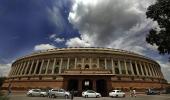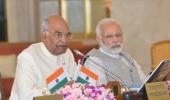The NDA's combined parliamentary and state-level committed Presidential votes number around 12,000 fewer than a majority, reports Aditi Phadnis.

As preparations begin to elect a new President of India (a new President must in place by July), all parties are assessing their positions vis-a-vis the dominant alliances -- the National Democratic Alliance and the United Progressive Alliance.
The electoral college for the Presidential election comprises MPs from both Houses of Parliament and MLAs from all assemblies.
The votes of the MPs are worth more than those of MLAs.
While each MP's vote has a value of 708, the votes of the MLAs from different states have different values, based on their population (in accordance with the 1971 Census) and number of seats (see table below).
According to this computation, the NDA is far, far, ahead of the UPA.
Although 52 MPs will retire and new ones will be elected in June, there is no doubt that at least in Parliament the NDA far surpasses the UPA.
Of a total of 776 MPs, the NDA has 442 (326 in the Lok Sabha and 116 in the Rajya Sabha). It controls upwards of 310,000 presidential votes whereas the UPA, with all its alliance partners, has only around 96,000.
Not all parties in Parliament are in the NDA or the UPA.
Some, like the Trinamool Congress cannot support the NDA.
These represent around 90,000 Presidential votes.
The NDA also has supporters who do not qualify as alliance partners.
For instance, Biju Janata Dal chief Naveen Patnaik announced recently the BJD will not support non-BJP Opposition parties' efforts to forge a common front and put up an independent Presidential candidate.
The total strength of such parties is around 47,000 Presidential votes.
So the parliamentary numbers are clear.
Even if the entire Opposition joins up, it cannot defeat the BJP candidate solely on the basis of its parliamentary presence.
However, the computation changes when considering the votes that lie in the assemblies.
The Bharatiya Janata Party alone commands around 184,000 Presidential votes.
This is due to the fact that it has MLAs across India in states where it is in power, but also in those that it is not.
On the other hand, in UP, the number of its MLAs has come down from what it was in 2017, when Ram Nath Kovind was elected President.

And when you add its alliance partners, the NDA in the states controls around 218,000 presidential votes.
The UPA, on the other hand, controls 162,000 votes. So it is a relatively slender majority.
When you add the anti-NDA parties' Presidential votes to this, the majority becomes all the more slender.
The Samajwadi Party, for instance, now has 111 MLAs in the UP assembly.
The UP MLAs command a higher vote value in the Presidential election than any other state.
Non-UPA, non-NDA parties like the Aam Aadmi Party and others represent almost 161,000 Presidential votes.
Without going into statistical minutiae, this time around, the NDA's combined parliamentary and state-level committed presidential votes number around 12,000 fewer than a majority: But only if the entire Opposition combines against the BJP.
This is unlikely to happen.
The Aam Aadmi Party has announced that it will not work either with the BJP or with the Congress.
Presumably this applies to the Presidential polls as well, though party chief Arvind Kejriwal still has to specify this.
But the BJP has powerful weapons in its arsenal.
It knows, that the YSR Congress in Andhra Pradesh, for instance, and the Telangana Rashtra Samithi in Telangana, for instance, can never go with the Congress.
So it is preparing to leverage this advantage in its favour.
Trinamool Congress chief Mamata Banerjee has already said she proposes convening a meeting of anti-Congress, anti-BJP parties to force the Congress to back a common Opposition candidate.
This makes the Congress outlook on alliance partners crucial.
If India's oldest party can humbly declare that it will back anyone who will defeat the NDA, even if it is not a Congress candidate, the contest will become interesting -- although even then, the NDA undeniably has greater leverage than the UPA in sending its candidate to Rashtrapati Bhavan.












 © 2025
© 2025